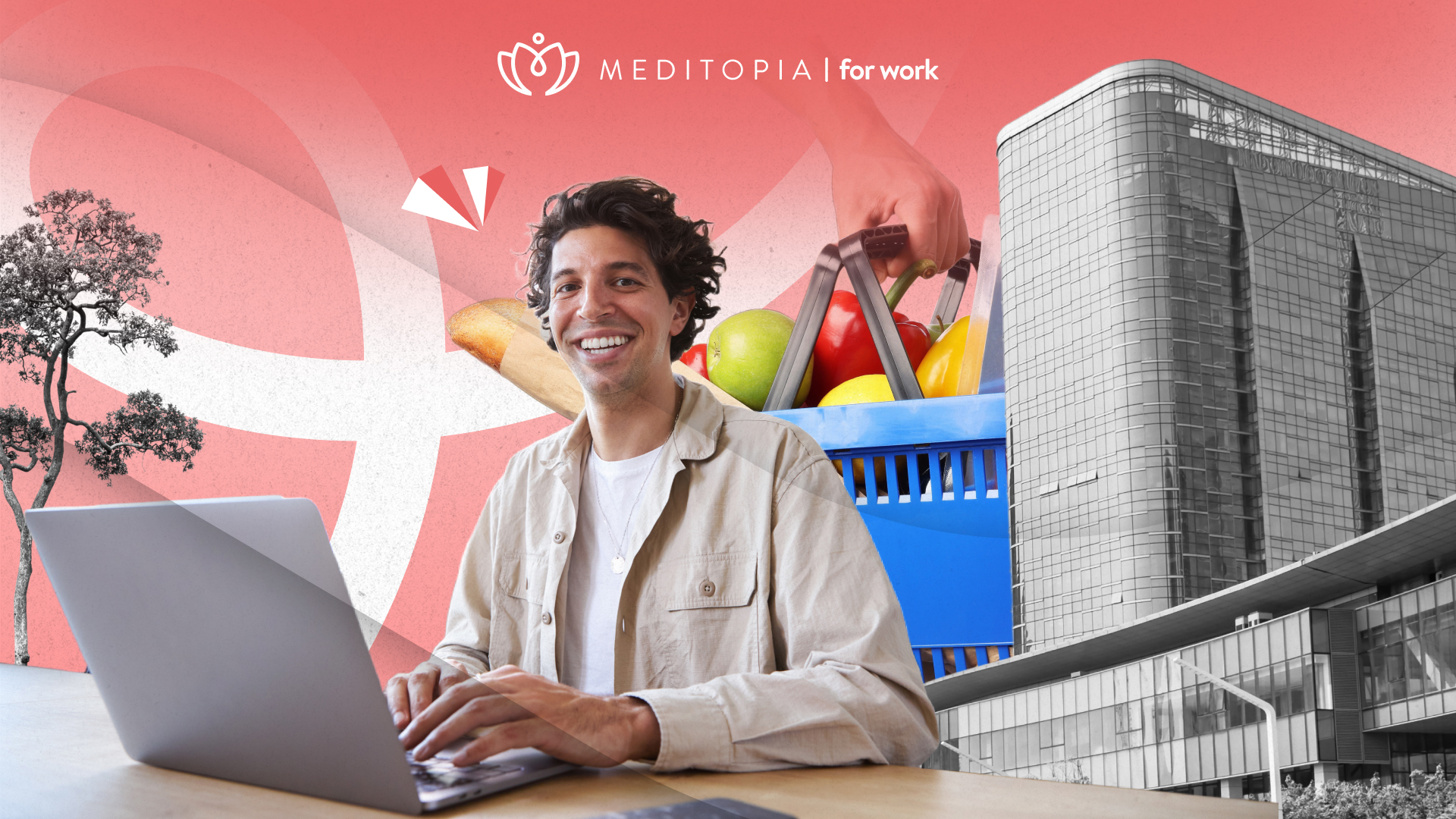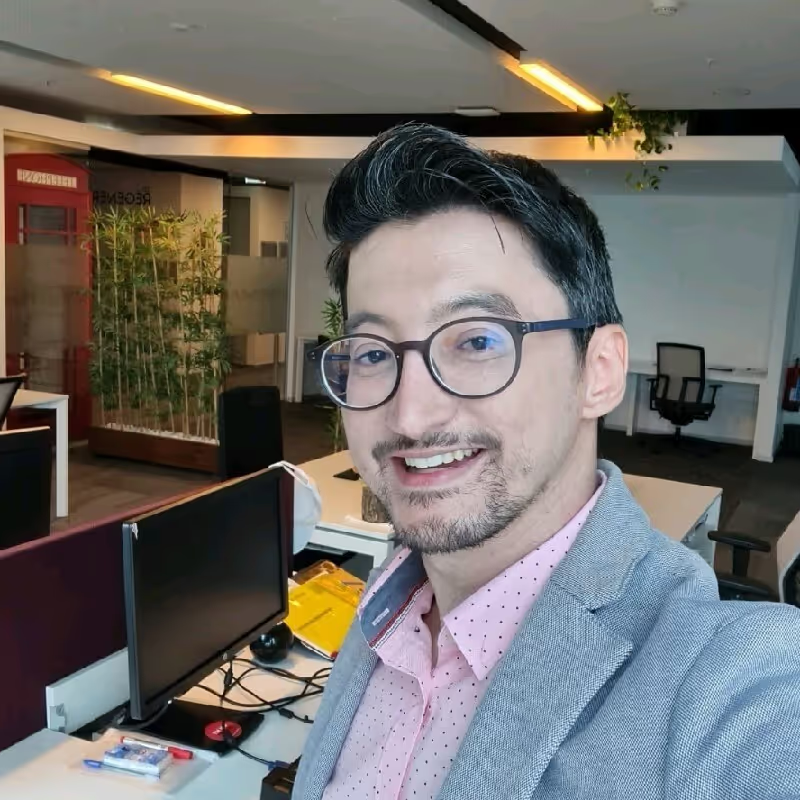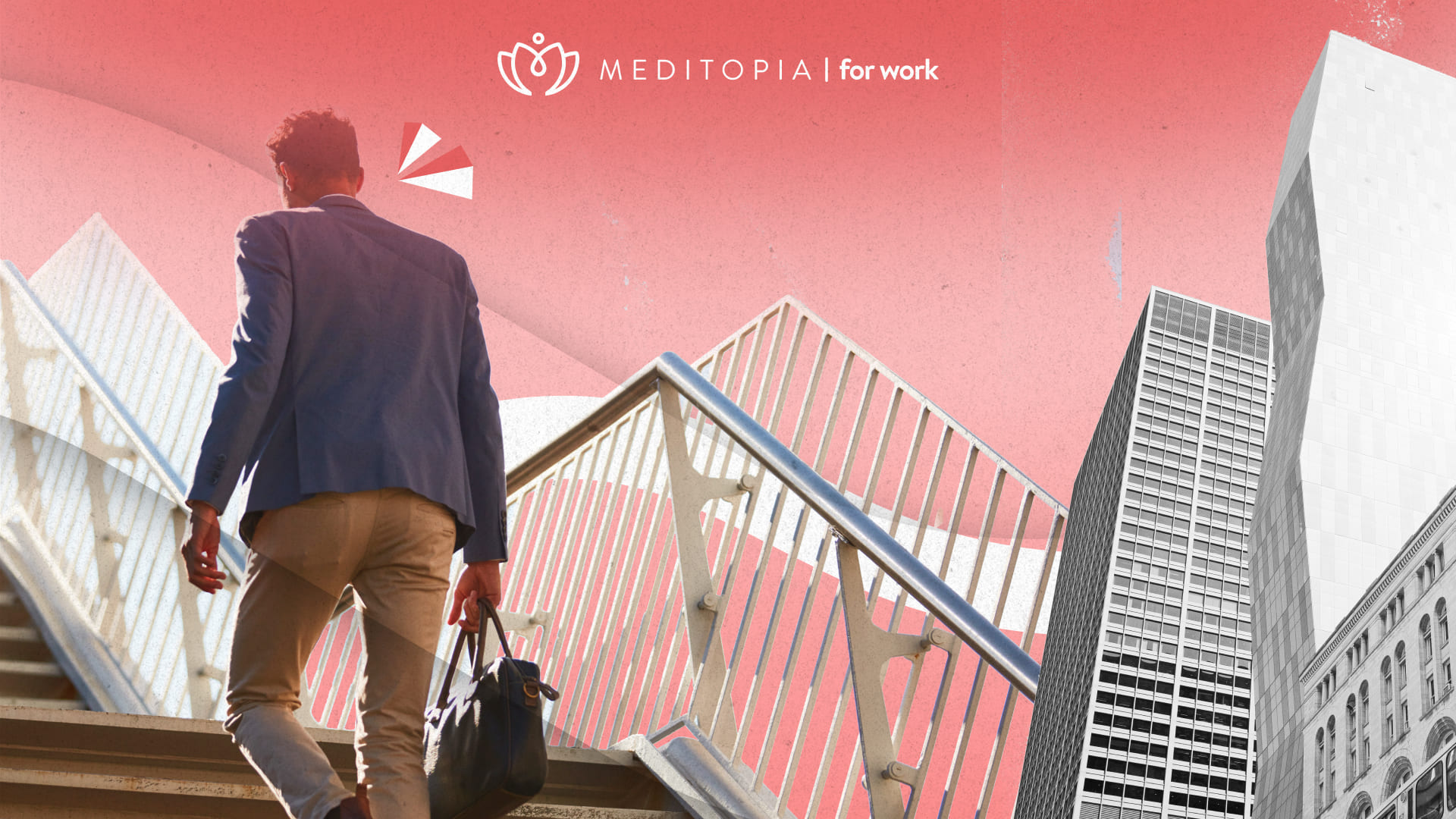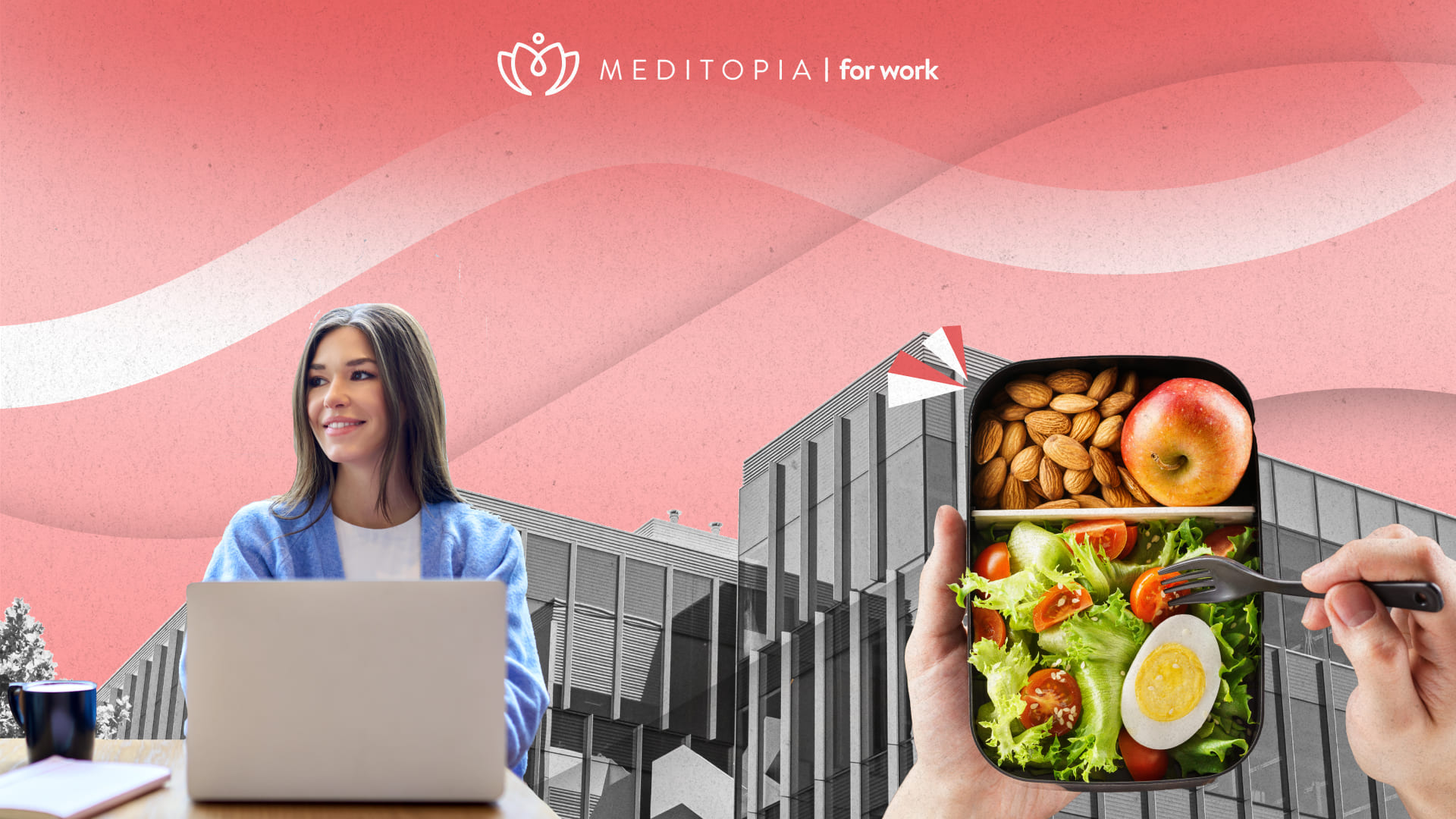In FMCG, nearly 93% of consumers now rate emotional health as equally important as physical health, yet more than 50% say their own mental wellbeing is poor, highlighting a clear mismatch between awareness and reality [1]. The Fast-Moving Consumer Goods (FMCG) and Consumer Packaged Goods (CPG) sector is navigating accelerating global demands, and specialized wellness programs can deliver significant and lasting positive changes. Let's check how!
Why Wellness Matters: Consumer Goods Industry Benchmarks
Professionals in this space contend with intense stressors, from aggressive growth targets and global launches to supply instability and consumer scrutiny, that make mental health support critical.
- Work environment risk factors: Poor job design, high workload, job insecurity, and limited control are known contributors to workplace mental illness, which afflicts an estimated 15% of working‑age adults globally [2].
- Acute sector-level stress: Over 79% of employees in major economies report experiencing work-related stress, with long hours and heavy workloads among the leading causes [3].
- FMCG companies often struggle with attrition driven by stress, lack of career progression, job insecurity, and poor leadership support—even when job satisfaction is moderate, intention to leave remains high.
- As FMCG brands increasingly focus on cognitive health, sleep aid, and mental wellness products, employees expect their employers to follow suit with meaningful wellness initiatives [4].
- S&P Global research, the consumer goods sector—under which CPG falls—has a typical turnover rate of 7.7% annually, while manufacturing (closely related) runs at 6.3% [5].
Common Mental Health & Wellness Challenges
In the high-pressure FMCG and CPG environment, wellness isn't a one-size-fits-all initiative. These organizations operate at relentless speed, with teams working under constant deadline pressure, tight distribution windows, and frequent innovation cycles. As a result, unique mental health challenges emerge that demand tailored solutions.
Here are key barriers HR leaders must address when building sustainable CPG wellness strategies:
- Chronic stress from demand cycles: Employees face frequent launch deadlines, rapid campaign rollouts, and seasonal spikes, all of which contribute to elevated stress levels.
- On-the-job fatigue: Long hours, shift rotations, and time zone coverage contribute to both physical and emotional exhaustion.
- Stigma and underreporting: Despite growing awareness, many FMCG employees still hesitate to seek help for anxiety or burnout due to fear of judgment or career impact.
- Frontline and field-team disconnect: Workers in distribution centers, sales routes, or warehouses often lack access to centralized HR tools, making it harder to engage with wellness programs.
- Inconsistent participation: Without mobile-first tools or relevant content, wellness initiatives often go unused by busy or deskless employees.
- Retention risk: Physically demanding work, irregular schedules, and limited growth opportunities continue to drive early attrition, particularly within the first 90 days.
To succeed, CPG health and wellness initiatives must be designed with these challenges in mind.
This means prioritizing flexible access, multilingual content, and short-form interventions that match the real pace of operations. When wellness meets workers where they are—on the production line, in the warehouse, or out in the field, impact follows.
What an Effective Wellness Program Looks Like in FMCG
To deliver real impact in the FMCG and CPG sector, wellness programs must be purpose-built. These are not traditional office environments, they are a mix of high-stress roles like brand managers navigating product launches, warehouse teams working night shifts, and frontline merchandisers covering vast territories.
A generic platform won’t cut it. The solution? Design industry-specific wellness strategies that integrate seamlessly with everyday operations. Here’s what defines a high-performing CPG wellness program:
- 24/7 accessibility: Given the non-stop nature of production and global time zones, wellness tools must be always available.
- Mobile-first and offline-ready: Field workers and warehouse staff often don’t have email or desktop access. Wellness platforms must function on smartphones and without Wi-Fi when needed.
- Anonymous, stigma-free use: Confidentiality encourages uptake, especially in cultures or teams where vulnerability is discouraged.
- Culturally relevant and multilingual content: The global workforce in this sector needs inclusive tools that reflect their languages and lived realities.
- Micro-interventions for quick relief: Short breathing exercises, stress resets, and fatigue recovery routines must be available for workers in time-constrained environments.
- Group and gamified options: Social engagement boosts adoption—team challenges, well-being scores, and recognition programs can help drive participation.
- Integrated reporting and HR automation: Automated onboarding, usage analytics, and targeted campaigns save time for busy HR departments managing large or dispersed teams.
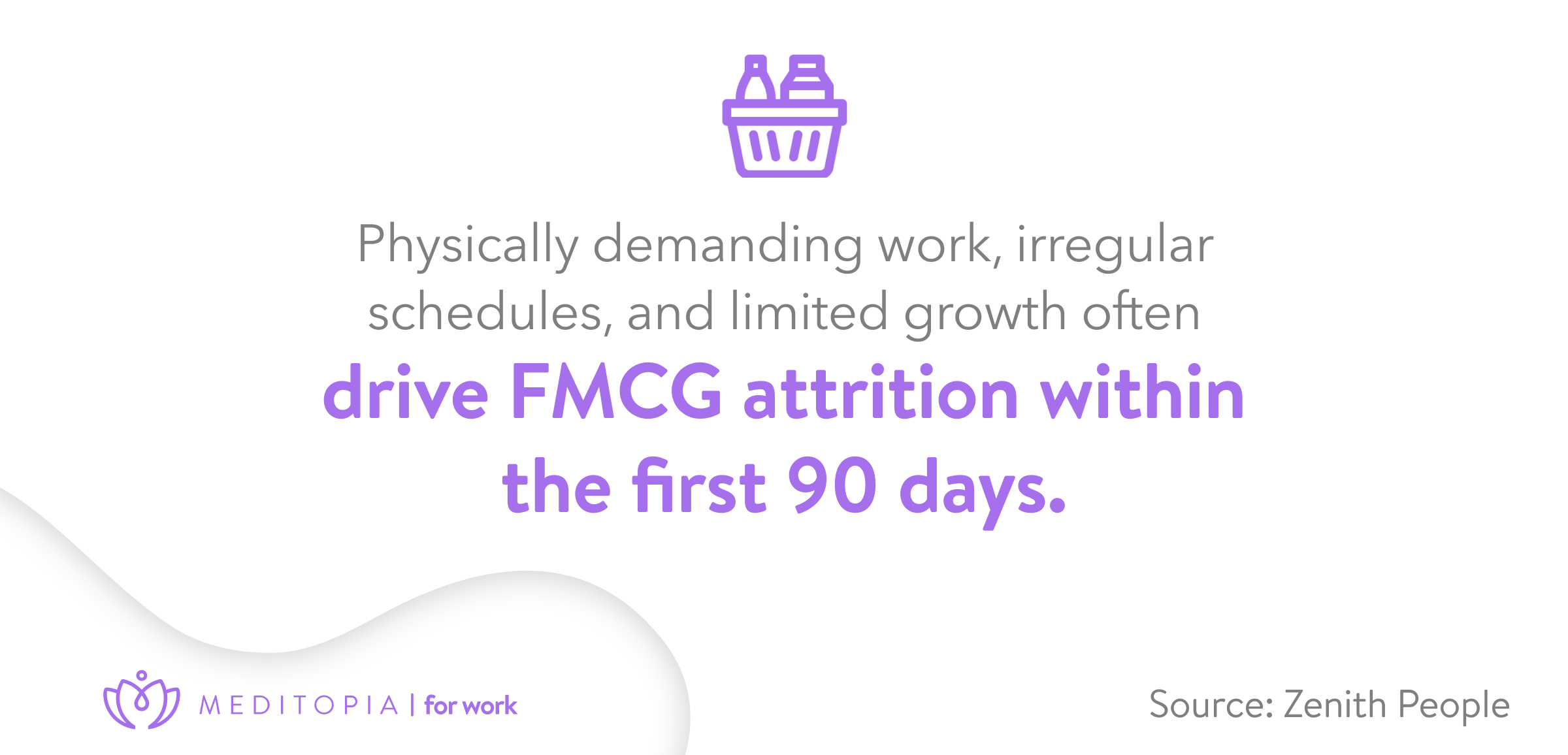
Example Wellness Program Benefits for Packaged Goods Sector
When wellness programs are thoughtfully tailored for the fast-moving pace of the FMCG and CPG industries, the results go far beyond morale boosts. These initiatives become key drivers of workforce stability, productivity, and engagement. Here are the measurable benefits of implementing effective industry-specific wellness solutions:
- Improved workplace performance: Employees equipped with mental resilience tools handle pressure, deadlines, and disruptions more effectively.
- Lower absenteeism and presenteeism: Short wellness check-ins, fatigue management tools, and mental health support reduce sick days and increase engagement on the job.
- Higher retention across roles: Whether on the factory floor or in product marketing, workers are more likely to stay when they feel their wellbeing is actively supported.
- Stronger adaptability during peak seasons: Wellness practices help teams maintain stamina and focus through seasonal demand spikes and global launches.
- Cultural transformation: Programs that include stigma-reduction campaigns, multilingual tools, and leadership support contribute to a more open, psychologically safe workplace culture.
When done right, CPG health and wellness initiatives become operational levers that sustain both people and performance.
How Leading FMCG/CPG Companies Approach Wellness
Real-world examples from global brands illustrate how wellness initiatives can be both culturally resonant and operationally effective in fast-paced consumer goods environments. Let's check what other comanies are doing in terms of corporate wellness.
Unilever
Unilever implements a comprehensive Wellbeing Framework spanning culture, support, leadership, and prevention, designed to support the whole person.
Key points of the program
- The Global Employee Assistance Programme (EAP) offers counseling, mindfulness-based stress reduction, life coaching, financial wellbeing, and resilience training.
- A Global Health Champions Network enables peer-to-peer mental health support across diverse teams.
- Leaders are equipped to prioritize psychological safety and wellbeing through training and role modeling.
Results
- The combination of peer support, leadership engagement, and preventative resources has helped weave mental health into organizational norms [6]
Nestlé
Nestlé embeds wellness in everyday workplace life, with preventive and personalized health support as foundational to its wellbeing strategy.
Key points of the program
- Onsite initiatives like fruit programs, bike-sharing, hydration stations, and annual personalized health check-ups (Nestlé NQ®) promote holistic health.
- The Workforce Nutrition Alliance and global “#HealthyLives” campaign provide nutrition education, risk awareness tools (e.g., “Know Your Numbers”), and behavioral nudges across locations.
- Mental health training for people leaders, including factory teams, ensures managerial support is widespread and inclusive [7].
Results
- These interventions foster daily wellness practices, drive awareness of health risks, and support managerial readiness.
Procter & Gamble (P&G)
P&G takes a holistic, life-stage-focused approach to employee mental health—building trust, flexibility, and advocacy within teams.
Key points of the program
- The company embeds wellbeing into everyday culture: leaders create safe spaces to discuss mental health, adapting support through different life stages.
- Peer support is formalized via Mental Health First Aiders (MHFAs), global mental wellness groups, and monthly newsletters that share mental health narratives and resources.
Results
- P&G leaders link these efforts to greater psychological safety and stronger personal-professional alignment, employees feel more willing to "speak up, reach out," and advocate for their own and colleagues’ wellbeing [8].
The Future of Wellness in FMCG/CPG
Technology is transforming how wellness fits into the fast-paced FMCG and CPG world, where employees juggle product launches, seasonal peaks, and global schedules.
- AI-driven personalization: AI tools tailor micro-interventions, like stress resets during launches or sleep tips for shift workers, while offering stigma-free, instant support.
- Wearables for fatigue and safety: Devices tracking stress, sleep, and hydration can flag early risks. Deloitte reports nearly 60% of global consumers own wearables, helping employers boost stress management and productivity [9].
- Mobile-first wellness apps: For field reps and shift staff without desktops, mobile platforms ensure access anytime. Research shows they reduce stress and improve sleep in shift-based workforces.
For HR leaders, these tools shift wellness from reactive support to proactive performance strategy, helping cut attrition, maintain focus in peak cycles, and build resilient teams.
Meditopia for Work: Wellness That Fits the FMCG / CPG Industry
Meditopia for Work is specifically designed to meet the fast-paced, high-pressure demands of the FMCG and CPG workforce. From manufacturing floors to global marketing teams, its mobile-first, scalable platform adapts to the dynamic and distributed nature of these organizations.
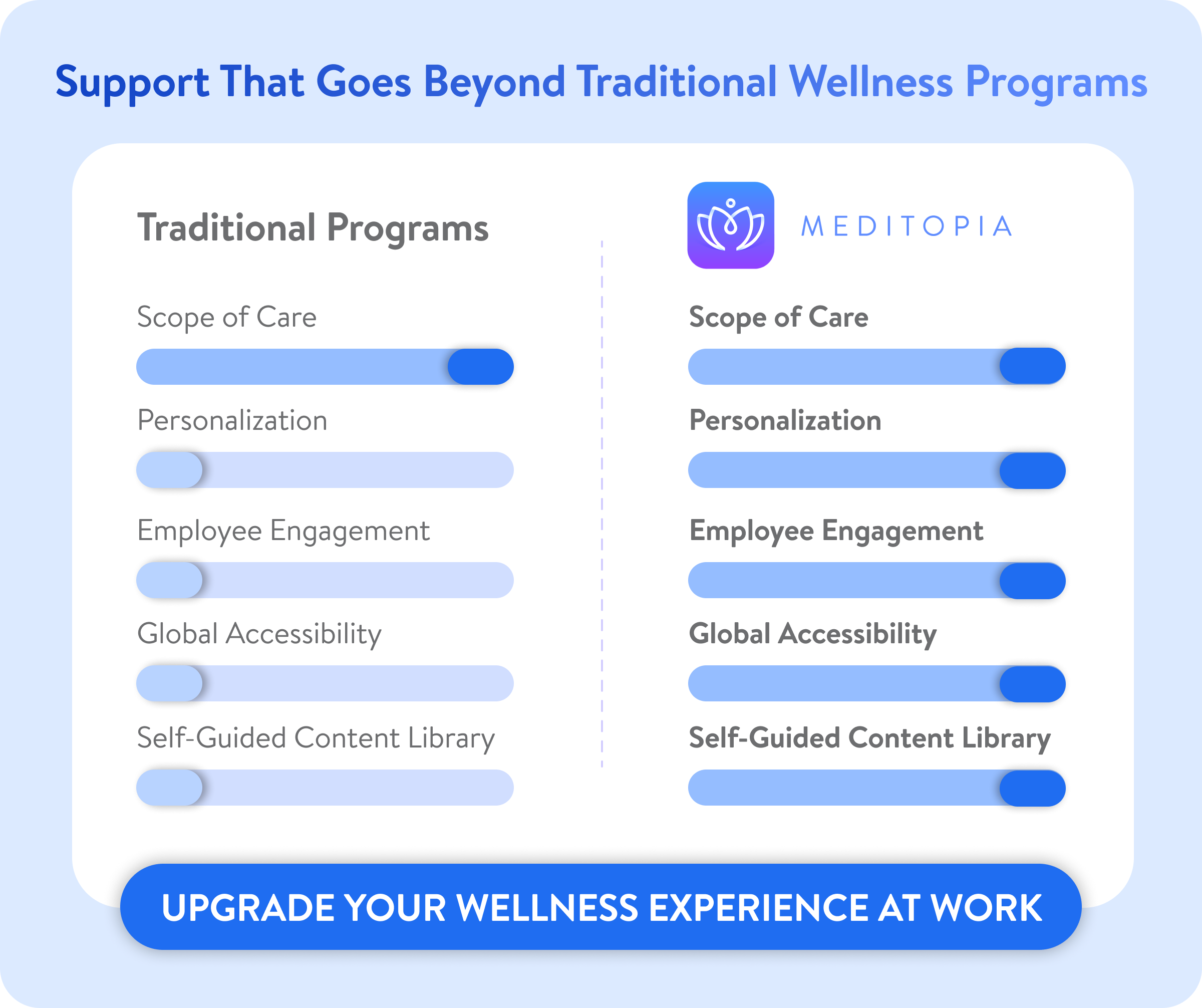
Here’s how Meditopia supports sustainable CPG health and wellness at scale:
- Mobile-first and offline-accessible: Employees can access wellness tools during shift breaks, in transit, or at home—no desktop or constant internet required.
- Targeted webinars and workshops: Sessions are tailored to FMCG realities such as burnout from demand cycles, emotional fatigue from brand pressure, and communication stress in cross-functional teams.
- Confidential mental health support: Therapy, meditation, and coaching services are offered in 14 languages, designed to reduce stigma and ensure global reach.
- Soul, Meditopia’s AI mental health companion: Offers real-time emotional support for employees dealing with high stress, particularly during peak periods or field work.
- Proven results: Users across industries report a 27% reduction in stress and a 21% increase in positive emotions within eight weeks of regular engagement.
- Bite-sized wellness content: Features short breathing exercises, stress resets, and recovery micro-sessions that fit seamlessly into FMCG workflows.
- 24/7 availability: Ensures support is accessible across shifts, time zones, and geographic markets.
- Anonymous usage and auto-onboarding: Simplifies access, which is especially valuable in dispersed or deskless teams.
- Expert support network: Includes therapists, trainers, nutritionists, financial advisors, and more—giving employees well-rounded, accessible care.
With Meditopia for Work, CPG wellness becomes an embedded part of the corporate culture, enhancing mental resilience, reducing turnover, and driving long-term employee engagement across the global value chain.
Explore Employee Wellness Programs Across Industries
From classrooms to construction sites, wellness needs vary widely. Explore how industries are meeting these needs and what’s emerging across the wellness space.


